How to get started in Humankind
Tips and tricks for the Civilization-straddling 4X.
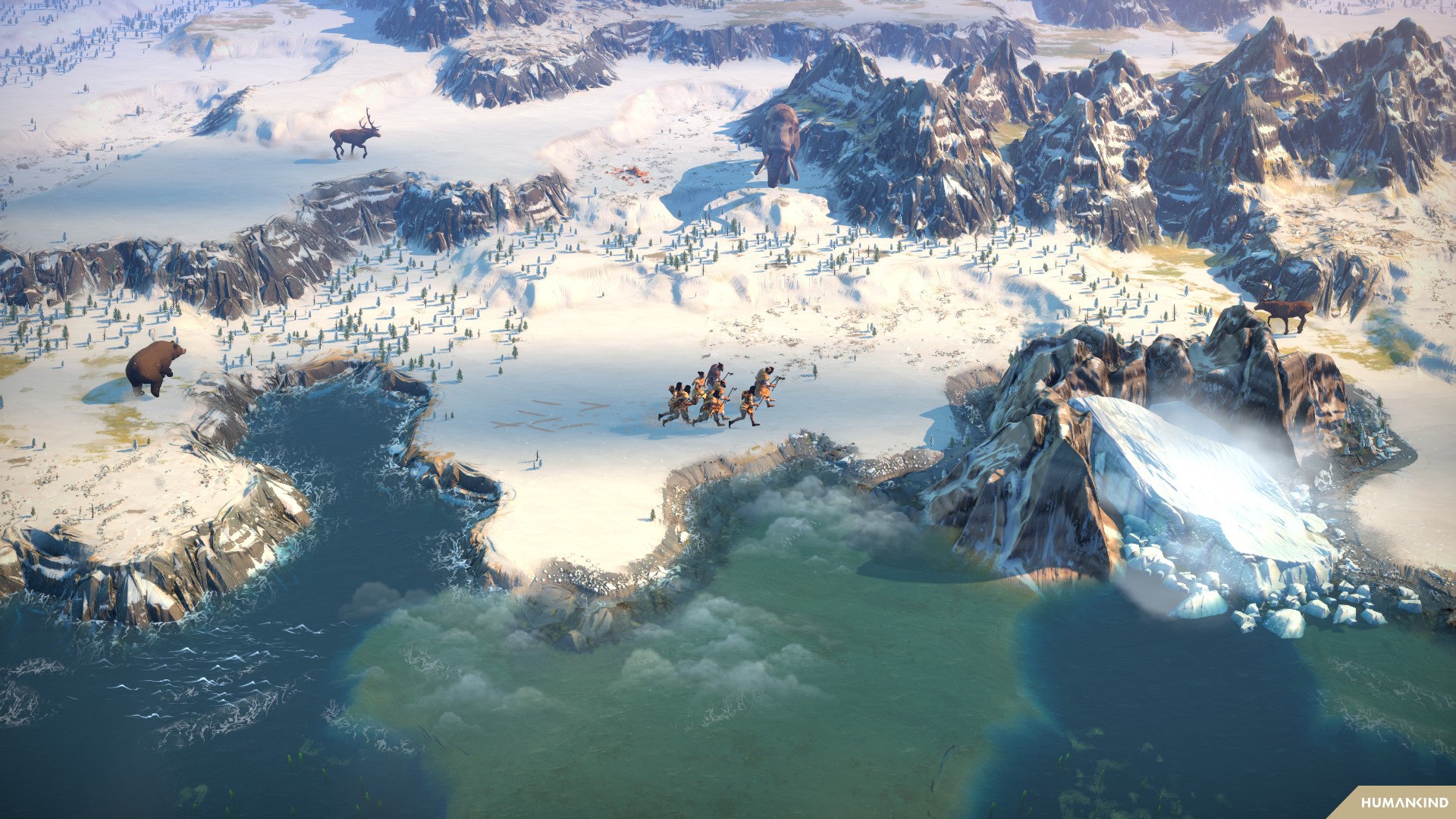
Looking for some Humankind tips to get you started? While Amplitude's so-called Civilization killer bears a lot in common with the famous 4X series, there are a fair few differences to get used to when you sit down to your first game. There are Cultures, Era Stars, Civics, Tenets, Ideological Axes—even as an Endless Legend player I found myself a little lost at first.
No wonder, then, that Humankind features a whole stack of in-game video tutorials explaining how every mechanic works. But even then, some things do fall through the cracks. You're likely to have to keep returning to the videos for answers, and honestly, nothing kills the magic more than having to watch video tutorials before you've even properly started playing the game.
That's where this Humankind guide for beginners comes in. Here, I'll walk you through the early stages, explaining the basic mechanics, and try to pre-empt the potholes that I fell into during my first few games.
Humankind guide: How to get started
Creating your leader
Humankind's AI avatars feature a variety of defining traits, but there's no need to worry about these when you first start a game. Since you'll be playing the character yourself, they won't affect anything—all you need to do is decide your avatar's personality, and how crazy they look.
If you want to send your AI character to fight your friends, then here's what each defining trait does:
- Archetypes: These 11 options decide your AI avatar's behaviour and response to particular situations. Each one is set to 'balanced' by default, but you can change three to represent important characteristics. For example, in the Trust category, you can either choose 'Trusting' or 'Wary' to alter how your avatar responds to other players.
- Strengths: These two basic bonuses reflect preferred playstyle and range from increased unit strength to boosts in production.
- Biases: These two tendencies are behaviours that your avatar will attempt to follow, such as trying to ally with everyone, or building one huge city.
You can unlock more of each by earning in-game trophies. Currently, you can only make one avatar to play as, but you can view the archetypes, strengths, and biases of your AI opponents in the pre-match menu by clicking on the settings part of their portrait.
Keep up to date with the most important stories and the best deals, as picked by the PC Gamer team.
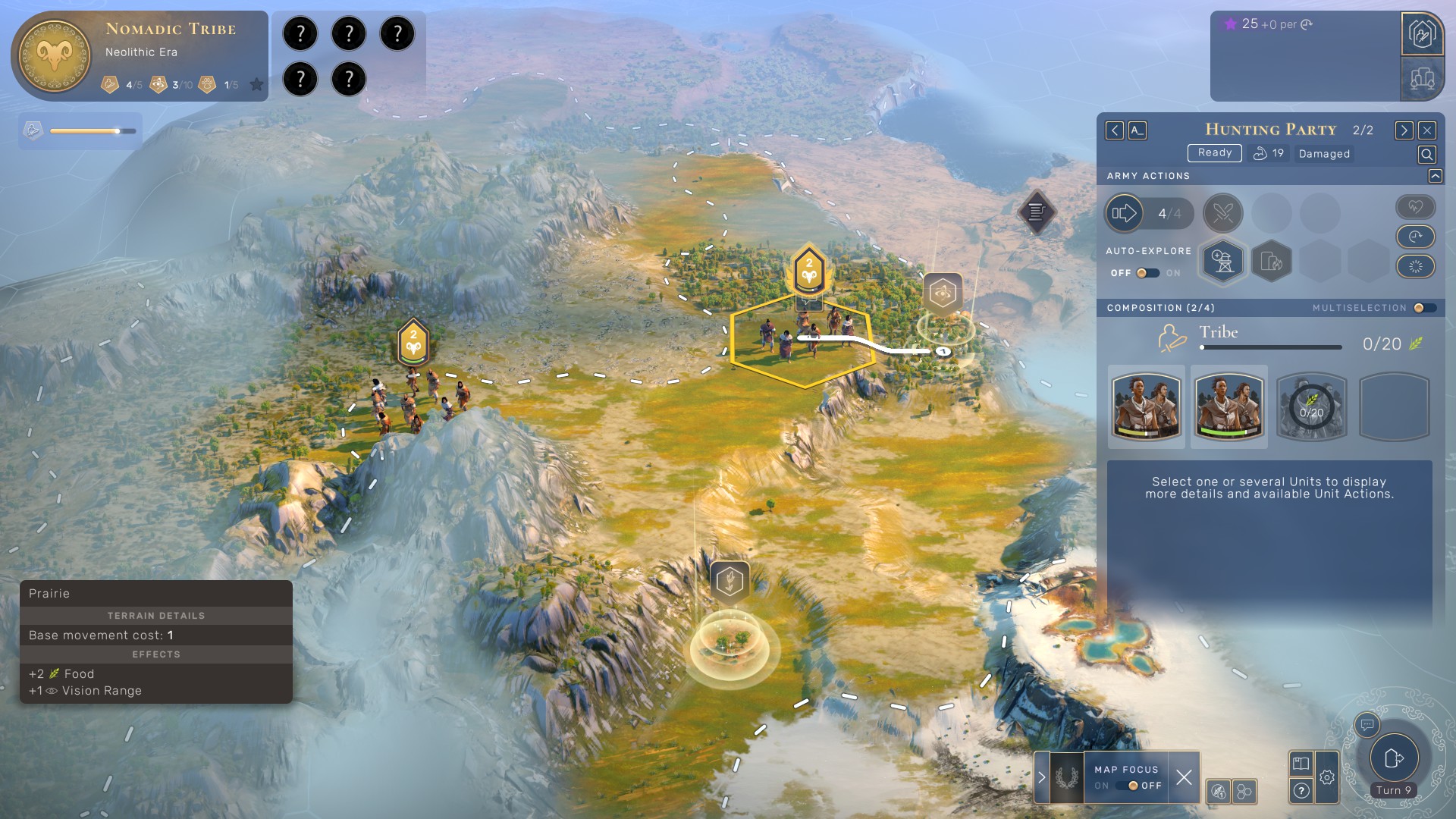
The Neolithic Era
You start each game of Humankind as a wandering tribe in the Neolithic Era. You must earn an Era Star—Humankind's advancement currency—to move onto the Ancient Era and choose your first culture. Here are the three ways to earn that star:
- Get Tribe members: You create new Tribe members with food by finding curiosities marked with the Grain symbol, ransacking sanctuaries or outposts, and hunting animals. Just remember that armies can only have four units, so if you want to get any more Tribe members, you'll have to split it to make room.
- Discover Scientific Curiosities: These curiosities are marked with an Atom symbol and give you the Influence resource, which can be used to establish outposts. This lets you plant your flag in valuable territory and choose some prospective city locations.
- Hunt animals: This is the hardest Era Star to earn, since you generally need at least two Tribe members to safely hunt a deer, and three for a mammoth, and even then, you could still lose some. However, they can be a good source of food if you have the numbers. Just right click on them to initiate a battle, and remember to use the high ground.
Humankind features a number of different match speeds, and these lower the requirements to earn each Era Star, but generally it's easiest to get Tribe members at first no matter what the speed. You also get new Tribe members from some set narrative events during the Neolithic Era, and creating a load of units means that when you establish a city, you can disband some of them into it for an initial population boost.
But if you're thinking, 'hey, why don't I take my ten Tribe members and destroy an opponent before they even leave the Neolithic Era?', you can't. If a player loses all their Tribe members, they won't be eliminated like they are in Civ games—they can simply rebuild. It is, however, worth ransacking their outposts if you happen upon them, either to kick them off good territory or get a hefty food bonus.
The most important thing in the Neolithic Era is covering ground to find curiosities, sanctuaries, and potential settlement sites where you can plant outposts. This is where river tiles are useful: they cost extra movement to enter, but grant increased movement provided you travel along them.
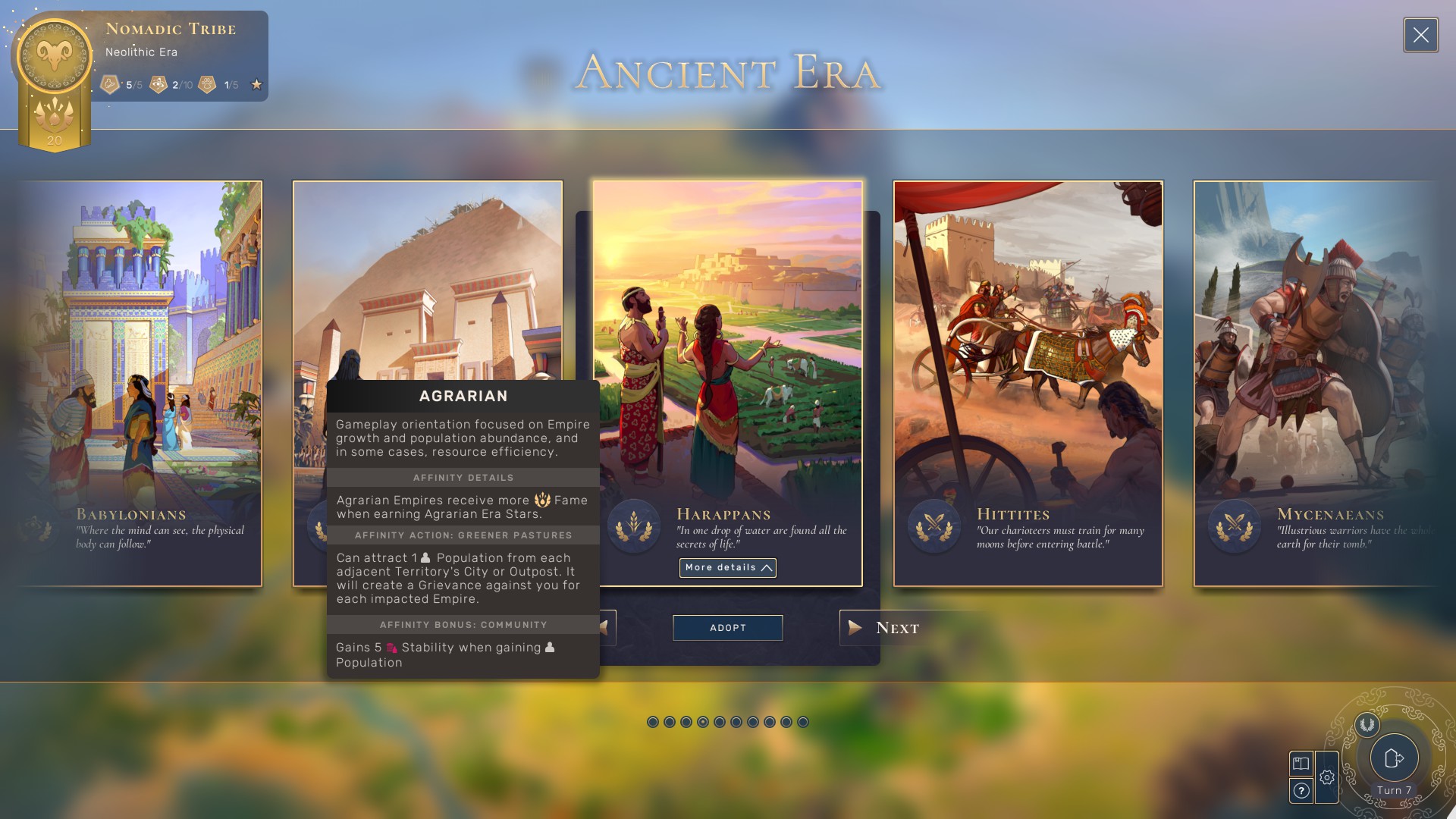
Choosing a culture
While you can stick around in the Neolithic Era for as long as you want earning those two extra Era Stars, it's better to pick your culture sooner rather than later. When another player chooses a culture it's locked for everyone else, and this limits your options when you come to decide.
Every culture has one of seven Affinities, which governs its strengths and particular playstyle:
- Agrarian
- Militarist
- Aesthete
- Merchant
- Builder
- Expansionist
- Scientist
Each culture features an affinity action, an affinity bonus, a unique legacy trait, an emblematic quarter, and an emblematic unit. Long story short, these are essentially bonuses that allow that culture to excel in a particular playstyle, earning Era Stars and extra Fame for completing goals based around their affinity. Whoever has the most Fame at the end of the game, wins.
When picking your first culture, it's worth considering not only how you want to play, but also how best to take advantage of what you found in the Neolithic Era. Perhaps you discovered a grassy river delta that would be perfect for the Harappan's Agrarian playstyle, growing lots of food and population with their river-tile bonus, and farming-based emblematic quarter.
But maybe once you get to the Classical Era you'll choose a Militarist culture to take advantage of that extra population and invade your neighbours. Humankind is all about combining cultures to create a playstyle, allowing your civilization to take advantage of its fortunes, but also adapt to overcome the challenges facing it in each new era.
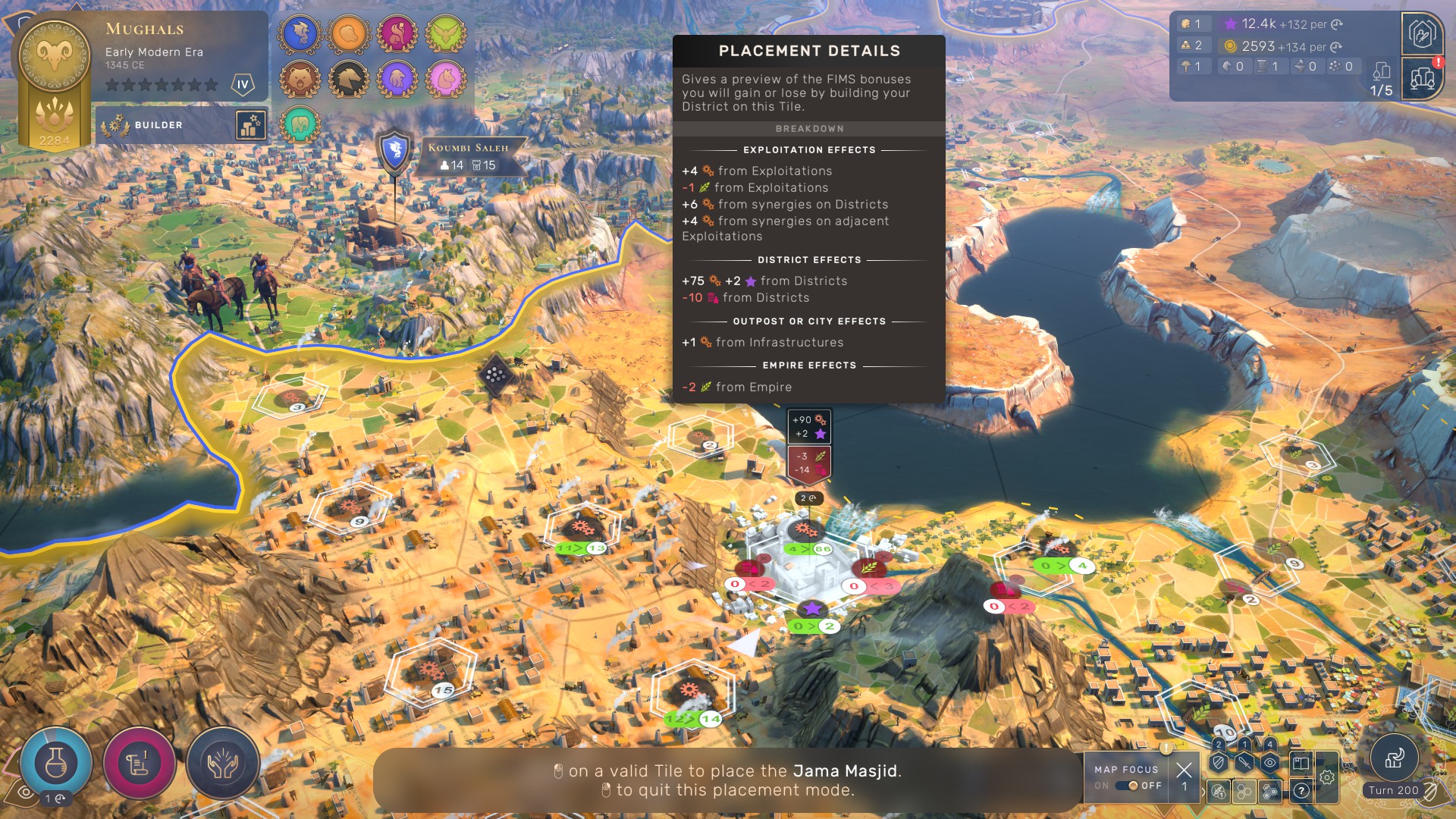
Founding your first city
Now you have a culture in the Ancient Era you can upgrade an outpost into a city. This will give you ownership over a region—marked with a dotted line on the map—allowing you to start researching technologies, building districts and infrastructure, and taking advantage of strategic and luxury resources.
Starting a city will also allow you to produce Humankind's four FIMS resources:
- Food: The Agrarian resource. Determines population growth.
- Industry: The Builder resource. How fast you make things in your production queue.
- Money: The Merchant resource. This is used to buy strategic and luxury resources, finish building projects early, and pay for unit upkeep.
- Science: The Scientist resource. How quickly you research technologies.
There are also three other separate resources that are worth understanding:
- Influence: The Aesthete resource. This is used to establish outposts, convert them to cities, assimilate independent peoples, and enact Civics.
- Population: This determines all other production, and can be used to create units, or finish building projects early.
- Stability: This is a measure of how happy your city is. It decides what events you get, whether your population deserts, or if a revolution occurs.
In terms of city placement, a high, easy-to-defend location with a good balance between food and industry is ideal. Too little food and you'll have to work hard to get more population, whereas too little industry means it will take your outpost ages to establish, and a long time to build anything. Placing your city in a region with a natural wonder also grants positive stability and other effects, as does access to luxury resources.
Adjacent regions are important, too. In Humankind, it costs Influence to create new outposts and cities, and this cost increases the further away they are from your territory. Outposts can be used to sell luxury and strategic resources, but they can also be attached to adjacent cities, contributing their population and territory. In this sense, it's worth picking a city based on valuable adjacent regions for expansion, too.
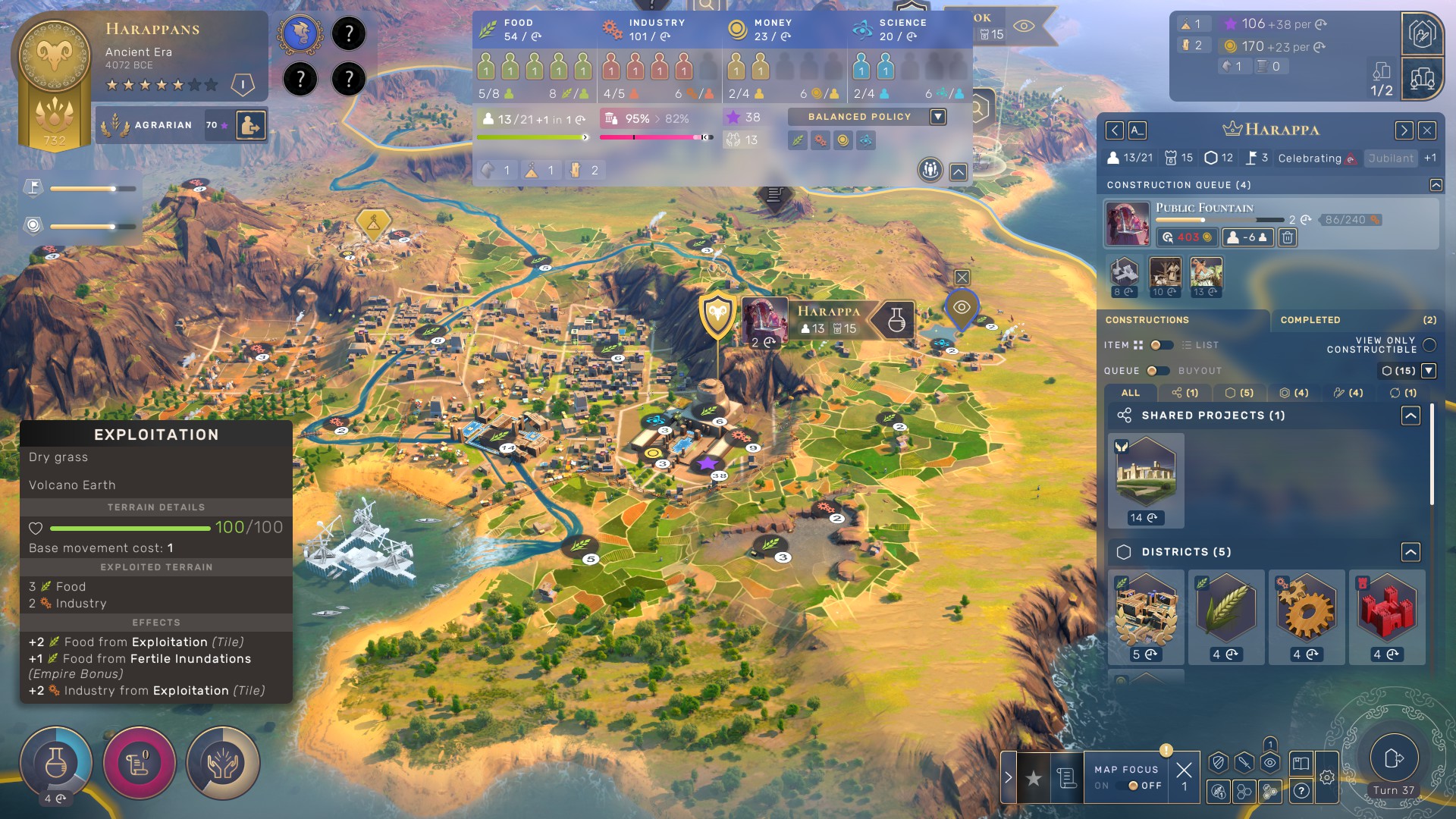
So how do I make a good city?
City-building in humankind is a balancing act. You need districts to increase population cap and production, but more districts reduce stability, as do attached outposts. You can increase stability by building wonders, sanitation infrastructure, religious sites, commons quarters, enacting public ceremonies, garrisoning soldiers, or with the religious procession. You can also purchase luxury resources from other empires to gain their positive effects.
The key to creating a great city is using district placement and stacking effects to maximise the production yield of certain tiles. Your culture's emblematic quarter is one of the most powerful tools in achieving this, since it generally offers a bonus to adjacent districts of the same kind, or even based on the number of district workers you have.
For example, if you had an industry-focused city, and decided to advance to the Early Modern Era as the Mughals, you'd get access to their Jama Masjid emblematic quarter. This district gives +3 industry for every worker you have, as well as every adjacent maker's quarter. When you combine this with one or two of the legacy traits that boost output for specific tiles, you're getting a serious boost in industry.

Sean's first PC games were Full Throttle and Total Annihilation and his taste has stayed much the same since. When not scouring games for secrets or bashing his head against puzzles, you'll find him revisiting old Total War campaigns, agonizing over his Destiny 2 fit, or still trying to finish the Horus Heresy. Sean has also written for EDGE, Eurogamer, PCGamesN, Wireframe, EGMNOW, and Inverse.

